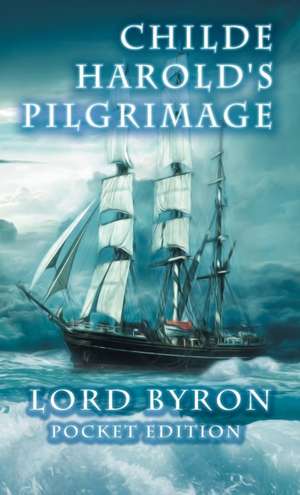Childe Harold's Pilgrimage
Autor George Gordon Byronen Limba Engleză Paperback – 4 sep 2018
| Toate formatele și edițiile | Preț | Express |
|---|---|---|
| Paperback (11) | 54.06 lei 6-8 săpt. | |
| – | 56.26 lei 3-5 săpt. | |
| – | 85.45 lei 3-5 săpt. | |
| – | 90.76 lei 3-5 săpt. | |
| CreateSpace Independent Publishing Platform – 8 dec 2015 | 103.55 lei 3-5 săpt. | |
| Jonathon Best – 4 sep 2018 | 54.06 lei 6-8 săpt. | |
| CreateSpace Independent Publishing Platform – | 68.93 lei 6-8 săpt. | |
| CreateSpace Independent Publishing Platform – | 69.39 lei 6-8 săpt. | |
| – | 69.78 lei 39-44 zile | |
| – | 72.45 lei 18-23 zile | |
| LIGHTNING SOURCE INC – 30 sep 2018 | 83.58 lei 18-23 zile | |
| Kessinger Publishing – 13 iun 2009 | 254.92 lei 39-44 zile | |
| Hardback (1) | 108.22 lei 3-5 săpt. | |
| Mint Editions – 8 dec 2020 | 108.22 lei 3-5 săpt. |
Preț: 54.06 lei
Nou
Puncte Express: 81
Preț estimativ în valută:
10.34€ • 10.78$ • 8.57£
10.34€ • 10.78$ • 8.57£
Carte tipărită la comandă
Livrare economică 03-17 aprilie
Preluare comenzi: 021 569.72.76
Specificații
ISBN-13: 9780995352049
ISBN-10: 0995352046
Pagini: 202
Dimensiuni: 108 x 178 x 13 mm
Greutate: 0.17 kg
Editura: Jonathon Best
ISBN-10: 0995352046
Pagini: 202
Dimensiuni: 108 x 178 x 13 mm
Greutate: 0.17 kg
Editura: Jonathon Best
Notă biografică
Lord Byron (1788-1824) was a British politician and poet. Born in London to a family of aristocrats and military officers, Byron was raised in Aberdeen, Scotland, where he struggled in school and was prone to violent outbursts. As a young man, he studied at Trinity College, Cambridge, gaining a reputation as a gambler, fighter, and womanizer. In 1809, he embarked on a tour of the Mediterranean, traveling to Portugal, Spain, Sardinia, Malta, Greece, and Constantinople. Byron returned to England in 1811 and published the first two cantos of Childe Harold¿s Pilgrimage in 1812, launching his career as a literary sensation. In 1815, he married the mathematician Annabella Millbanke; their daughter Ada would go on to a successful mathematician and pioneer of computer science. By 1816, however, the pair divorced over Byron¿s reckless behavior and serial infidelity, and the poet was forced to leave England due to scandal and insurmountable debt. He spent the rest of his life abroad, arriving in the summer of 1816 in Geneva, where he befriended Percy Bysshe Shelley and Mary Godwin. Their time at the Villa Diodati that rainy summer, which they spent writing and sharing stories and poems, is seen as a landmark moment in Romanticism. Mary (who would later marry Shelley and take his last name) composed her novel Frankenstein, while Byron continued his work on Childe Harold¿s Pilgrimage. Later that year, he left for Venice and became interested in Armenian culture and independence. In 1818, while in Venice, he began his epic poem Don Juan, which he would continue for the next several years. He became involved with the movement for Greek independence in 1823, raising a substantial amount of money for the cause and preparing, in 1824, to launch an attack on a Turkish fortress on the Gulf of Corinth. He fell ill before the expedition set sail, however, and died in April of that year.
